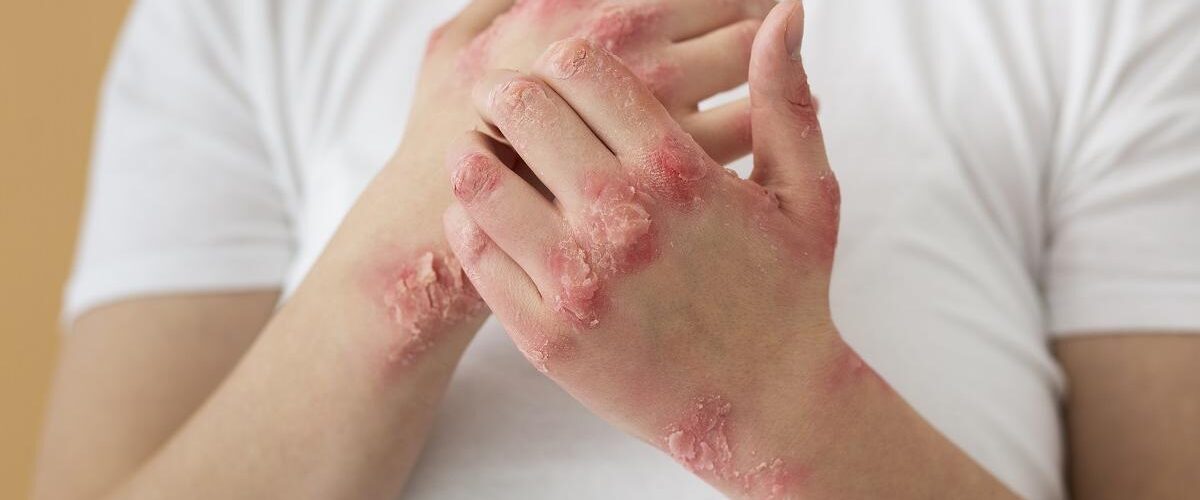Psoriasis is a chronic skin disease that affects millions of people. If you have been diagnosed with psoriasis or suspect that you may have it, you are in the right place.
Psoriasis is mainly found in the areas around the joints, scalp, groin and lower back. It is also characterised by the appearance of reddish inflamed areas covered by patches of flaking skin. Generally, there are no serious complications, although it can sometimes be painful.
The main characteristic of psoriasis is the appearance of red spots on the skin, which can be small in size, or spread to cover large areas. Thus, the plaques formed will become scaly, and small bumps may appear around the affected area.
The lesions can be located in different parts of the body; that is why it is most common to find them especially on the back, extremities and scalp. However, there are cases in which they affect areas such as the armpits, genitals, navel, and even under the nails. Certainly, it is not common, but sometimes psoriasis can cause itching and, in the most severe cases, pain.
The objective of the treatment is mainly to reduce the symptoms. In addition, the prevention of secondary infections.
For this, there are three options for treating psoriasis: topical substances, systemic drugs and phototherapy.
Psoriasis is initially treated with products that are applied directly to the skin.
- Creams or lotions with coal or anthralin. Anti-dandruff shampoos. Moisturizers. Keratolytics; products that remove excess skin, thus reducing flaking. Similarly, Vitamin D analogues, prevent the proliferation of keratinocytes; derivatives of vitamin A. They have a similar efficacy to products based on vitamin D. Topical corticosteroids; Corticosteroids are immunosuppressants, so their use is only recommended in cases of mild psoriasis.
- Natural treatments: Aloe vera and pita. Both have emollient properties. Palomilla de tintes or root of traitor. Plant of the borage family; like the previous ones it has emollient properties, which is why it has been traditionally used to alleviate the symptoms of different skin pathologies.
Systemic drugs
These types of drugs act from within the body; they are normally administered orally, although some can also be found in injectable form.
- Medications with vitamin D or vitamin A (retinoids, such as Acitretin).
- Cyclosporines, immunomodulators.
- Biological medications. (etanercept, adalimumab, infliximab and ustekinumab).
- Anti-inflammatory and antiproliferative effect. It is the most widely used systemic drug.
Phototherapy
The treatment is based on controlled exposure to ultraviolet light (UVA or UVB). So, this method reduces inflammation and slows the rate of skin cell production in people with psoriasis. Indeed, high efficacy has been observed in clearing lesions and prolonged remission of flare-ups.
However, the drawback of this treatment is that it requires a minimum of 20 treatments, with 2 to 4 visits per week, followed by a maintenance treatment at variable intervals.
There are several application options for this treatment:
- Broadband UVB.
- Narrowband UVB.
- UVA + psoralens (PUVA): reduction of lymphocyte influx and stimulation of melanocyte formation.
Advice for patients with psoriasis
- Moderate sun exposure.
- Bathing in the sea.
- Regularly using moisturizing creams, especially those based on natural products such as oats or calendula.
- Leave wounds uncovered, exposed to the air, whenever possible.
- Avoid eating fatty meats and increase the consumption of fruits and vegetables. • The best recommendation is to base your diet on fresh products.
- Avoid alcohol and tobacco consumption.
- Drink plenty of water to keep your body hydrated.
- Try to follow healthy lifestyle habits, avoiding stressful situations as much as possible.
- Due to its social and aesthetic impact, it can undermine self-esteem, so you could
Suffering from psoriasis can be a challenge, but you don’t have to face it alone. Seek professional help so you can overcome this disease and have a better quality of life.
I invite you to read another article:
Healthy kidneys: key to your health. Tips
Font:
https://www.lilly.com/es/que-alimentos-deben-evitar-psoriasis









